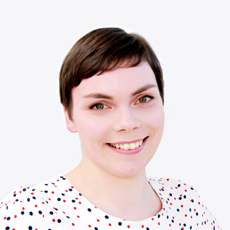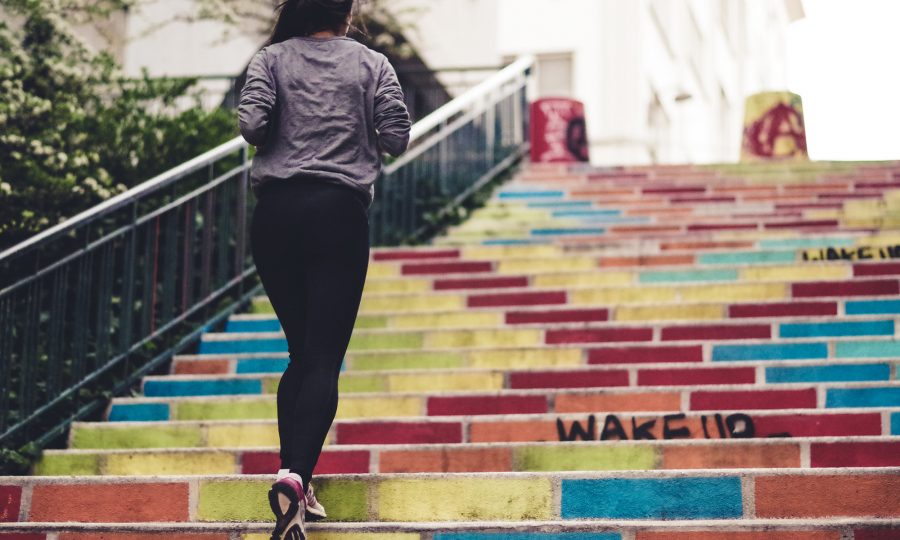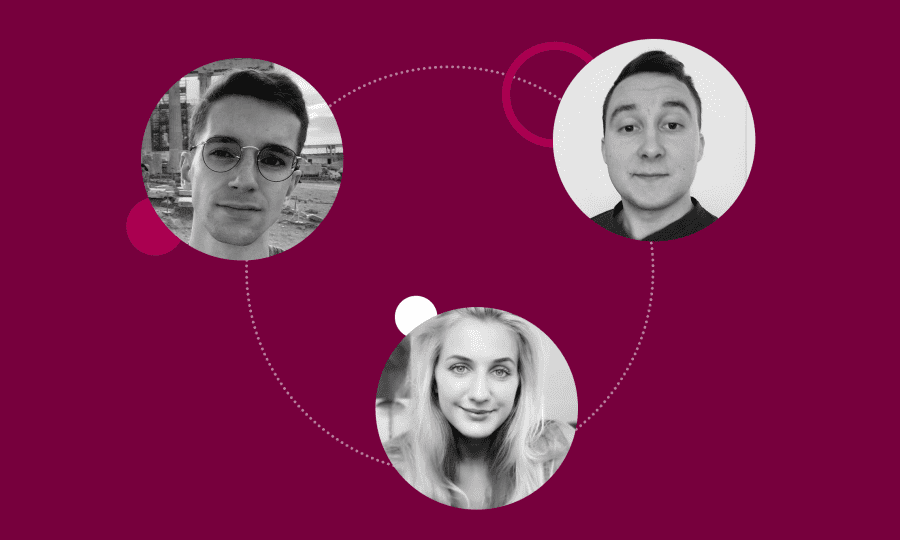This time, I sat down with Amila Jasarevic,  one of our Danish translators. Amila started out as a Danish translator in our head office in Whiteley. She later moved to London and, after a stint in one of our Account Linguist teams, rejoined the Danish translator team. She now works remotely from her home in Manchester.
one of our Danish translators. Amila started out as a Danish translator in our head office in Whiteley. She later moved to London and, after a stint in one of our Account Linguist teams, rejoined the Danish translator team. She now works remotely from her home in Manchester.
Which languages do you speak, Amila?
The first language I learned to speak was Bosnian, which is a Slavic language. I was born in Bosnia, which was part of Yugoslavia at the time. After the war broke out, we had to leave Bosnia. The UN placed us in Denmark as refugees. It didn’t occur to us that we were going to stay beyond the summer, so we just had summer clothes with us.
When we first arrived in Denmark, we were placed at a refugee centre, so I started going to school there. After two years, we got asylum and I changed to regular school with the other kids. I consider Danish my first language in addition to Bosnian; almost all of my schooling was in Danish, and so were my studies at university.
Apart from my two first languages, I speak English, German and French. I have a degree in French, but I haven’t used it actively for a while. At STP, I translate from English and German.
What did you want to be when you were growing up?
I wanted to be a veterinarian to save all the puppies! That was literally my thinking. This was before school. After that I thought I’d also like to be an astronaut. Maybe I could go to space for a while and come back and then be a vet!
Later on, when we had already settled in Denmark, I decided I would become a translator and an interpreter.
What was your first job?
I worked in a toy shop. I had a few hours of work each week: shelving, tidying up and stockroom work. Many years later I actually got a job as a translator at their headquarters!
How did you end up working in the translation industry?
At the refugee centre, kids were much faster at picking up languages than the adults, especially when the adults were severely traumatised. We were all acting as translators and interpreters from a young age.
My career in translation evolved from that; I was interpreting for refugees and others as a teenager. Apart from that, I had really good language classes and language teachers at school. Because French and German are important in international organisations, I took those languages. We had English classes as well, of course. I continued with French and German at university.
I think of translation as a craft: the languages you know are the tools you have. Your craft, your skills are transferable between the different language pairs you translate in. I suppose I’ve been training and developing my craft since I was at school!
In the end, you decided to focus on translation rather than interpretation?
Yes. When you do community interpreting, you go with the clients to hospitals, to court, to schools. You are constantly faced with unpleasant situations; it can be scary. I did even do a course on simultaneous interpreting at university; I’m very impressed by people who do that every day. Consecutive interpreting was my forte – I had done so much of it already. But I don’t regret shifting away from that.
What differences are there between working at the office and working from home?
I did enjoy working at the office in Whiteley and later in London. Now I work from home, so I can listen to music while I work and look out the window – when the trees have leaves I have a nice view. Working from home suits me well – there’s no commute. That’s a big plus! There’s also another benefit: I bake sourdough bread, so I can check on the dough during my breaks. That’s quite handy, too!
What does a normal day look like for a translator at STP?
Usually when I log on in the morning, I already have a good idea of what’s in my workload for the day ahead. I’ll often have some quick questions and updates in my inbox that I need to respond to. Then I just crack on with the first thing on the menu. Sometimes things go very smoothly, sometimes there are more emails to answer – but the main focus is the translation work.
What’s the most important quality for a good translator?
To not be afraid of using your expertise: you don’t need to – you shouldn’t – follow your source text word for word. You are the authority, you know what you’re doing – you need to have that confidence in your skills.
How do you look after your target language skills?
To stay current, I listen to podcasts and read books in Danish. I try to surround myself with Danish as it’s used right now. I try to keep it diverse – I’m quite systematic about it, there’s something almost clinical about how I try to make sure I get a good variety. I also like to watch Danish stuff on Netflix – I love Rita and Hjørdis!
What is your favourite part of your role?
I get to focus on my craft and on the language. I want to play with words – build castles with them!
Machine translation – friend or foe?
I’ve seen it be useful in specific categories. I find machine translation post-editing a productive way of working in certain domains, especially with technical texts. You have to strike the right balance between under-editing and over-editing machine-translated output.
If you could do any other job for a week, what would it be?
I’d like to be a travel writer or a photographer. That’d be cool. I’d go somewhere warm! It’d be interesting to visit somewhere new, like Greece or Japan.
If you could wake up and be fluent in a new language, what would it be?
A coding language maybe! Or Japanese, just because it’s so far removed from the other languages that I speak. I would gain a different way to view the world – and I like the way Japanese sounds.
Do you have any language-related pet peeves?
Yes! It’s something that happens in Danish, which has a lot of compound nouns. People don’t always write them together or forget to write the hyphen. You see it in the news and online and it’s so annoying! Writing compound nouns together is logical, it impacts meaning!
An example would be a shop sign that says “Bedstemor cykler, DKK 500”. If you write the first two words separately, “granny cycles” becomes a statement and no longer refers to the old-timey bicycles the shop is probably selling for 500 Danish kroner – instead it suggests some kind of senior citizen cycling spectacle.
What’s your favourite word?
It’s lørdag (“Saturday” in Danish). I like the way it sounds. I remember learning it when I was little at the refugee centre. This one girl taught me the days of the week, I remember her saying “lørdag”: the /œ/ sound was new for me, I think – it’s not a phoneme in Bosnian.
What’s the one thing about you that surprises people?
In Manchester, people are perhaps sometimes surprised to learn that I’m both Danish and Bosnian. In Denmark, people don’t seem thrown by it.
Describe yourself in three words.
Traveller, foodie, adaptable.
It’s fika time. Tea or coffee?
I’d go for tea. I wasn’t a big tea drinker before I came to the UK, but tea is different here – I like it. Coffee has too much caffeine, I can’t handle it! I take my black tea with plant milk, like people do here.
Who do you most admire, and why?
I admire people who get up after they fall and people who are not afraid to fall – people who have the courage to take risks. I think I worry too much about failing at something. I’m just cautious, I suppose. I find people who manage to bounce back after adversity really impressive.
How do you unwind at the end of a long day?
Often I watch something on Netflix – fantasy or science fiction. I like to read novels as well; that’s my form of escapism! I also find cooking quite relaxing.
What are you reading right now?
I’m reading a Danish book I picked up from the bring-and-share book shelf at our head office in Whiteley: Rouletten by Niels Lillelund. It’s a crime novel: a police officer is investigating a case where some casino workers have been murdered. I haven’t guessed who the killer is! It takes place in Copenhagen, which is interesting and a bit nostalgic for me, as I used to live there.
Where is your favourite place to be?
In water, swimming. Or, hiking somewhere far away from towns and cities. The Peak District and the Yorkshire Dales are great for hiking and walking – they’re so close and there’s always something new to see.
Describe STP in three words
Diverse, welcoming, sociable.
About Sandberg, Icebreaker, Icebreaker March 2019, Staff spotlight



